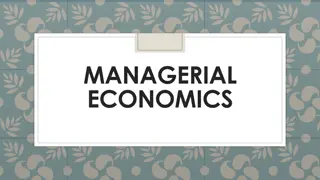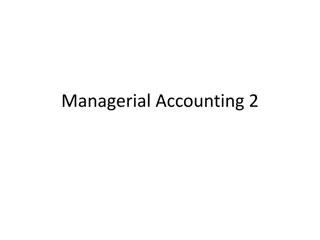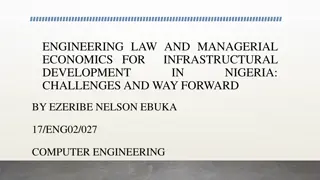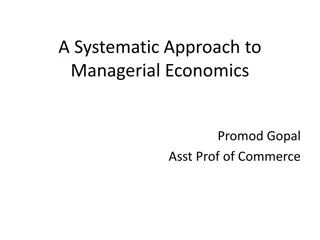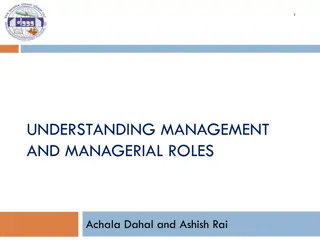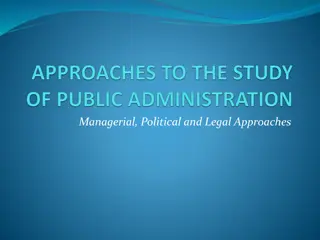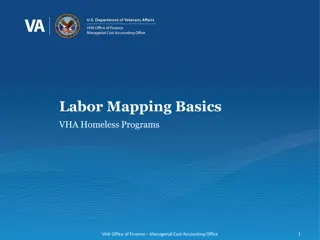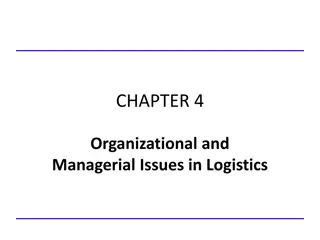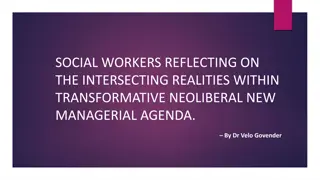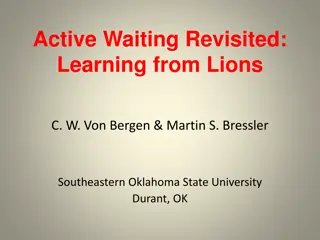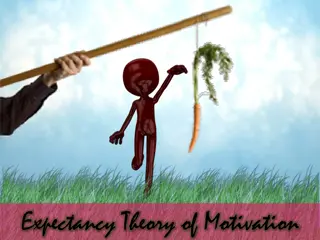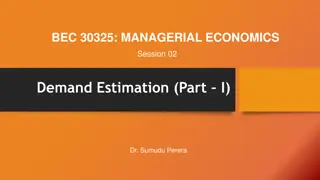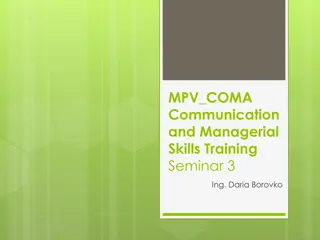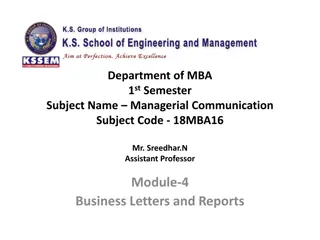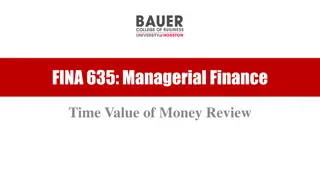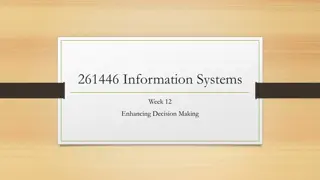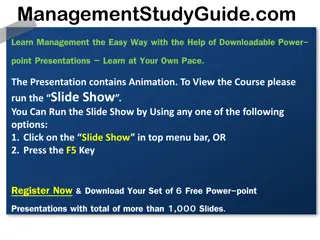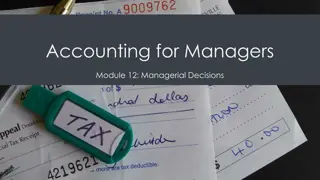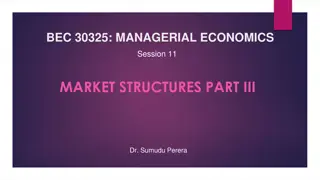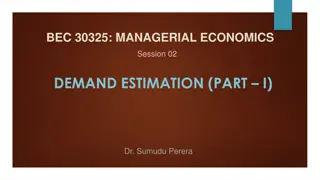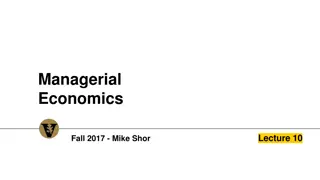Understanding the Scope of Managerial Economics
Managerial economics plays a crucial role in decision-making processes within businesses, focusing on optimizing limited resources for profit maximization. It encompasses both microeconomics and macroeconomics, utilizing economic theories to analyze the business environment. Key aspects such as dema
2 views • 6 slides
MANAGERIAL ECONOMICS
Managerial economics is the application of economic concepts to managerial decision-making. It bridges the gap between economic theory and business practice, helping firms optimize resource allocation and maximize profits. By analyzing microeconomic and macroeconomic factors, managers can make infor
5 views • 12 slides
Managerial Accounting 2
This chapter explores the fundamental concepts and principles of cost and managerial accounting, emphasizing the importance of understanding and controlling costs for organizational success. It discusses the various classes of manufacturing costs, distinctions between direct and indirect costs, and
1 views • 73 slides
Governance and Managerial Leadership of Formal Social Protection in Africa: Insights from Cameroon's National Social Insurance Fund (CNPS)
This presentation delves into the governance and managerial leadership of formal social protection in Africa, focusing on Cameroon's CNPS system. It discusses the institutional evolution of social protection, the challenges faced by bureaucratic and political stakeholders, and the roles of various s
0 views • 8 slides
Overview of Business Concepts and Managerial Accounting Practices
This content provides an in-depth overview of topics related to businesses, multinational corporations, and fundamental accounting concepts. It covers various lectures and chapters discussing types of businesses, international business methods, managerial accounting, cost management, and ethical con
0 views • 42 slides
Evolution of Mathematical Theories and Proof Systems
Development of mathematical theories such as model theory, proof theory, set theory, recursion theory, and computational complexity is discussed, starting from historical perspectives with Dedekind and Peano to Godel's theorems, recursion theory's golden age in the 1930s, and advancements in proof t
1 views • 29 slides
Engineering Law and Managerial Economics for Development Challenges and Way Forward in Nigeria
Engineering law in Nigeria addresses the application of laws in engineering practices while managerial economics focuses on resource management. The sector plays a crucial role in the country's economic development by addressing infrastructural deficiencies. Embodying moral values, laws aim to promo
1 views • 19 slides
Psychological Theories of Criminality: Understanding the Roots
Psychological theories of criminality delve into the association between intelligence, personality, learning, and criminal behavior. Major theories include Psychodynamic Theory by Freud, Behavioral Theory by Bandura, and Cognitive Theory by Kohlberg. These theories explore how unconscious mental pro
1 views • 20 slides
Managerial Economics: A Comprehensive Overview
Managerial Economics delves into the application of economic concepts in business decision-making. It bridges the gap between theory and practice, aiding managers in optimizing resources and achieving organizational objectives. The scope covers various aspects such as national income, employment, mo
0 views • 14 slides
Understanding the Theory of Firms: Neoclassical vs. Modern Approaches
The theory of firms is explored through the Neoclassical and Modern perspectives. Neoclassical theory focuses on profit maximization, while Modern theory delves into managerial, principal-agent, and transaction cost theories. The discussion covers criticisms of Neoclassical theory and the essential
1 views • 79 slides
Understanding Management and Managerial Roles
This content delves into the realms of management, focusing on managerial roles, skills, and the importance of managing resources effectively in a dynamic environment. It explores the art of getting things done through people and organizational resources, emphasizing efficiency, effectiveness, and t
2 views • 34 slides
Understanding Managerial, Political, and Legal Approaches in Public Administration
Public administration is viewed through three main approaches: managerial, political, and legal. The managerial approach minimizes the distinctions between public and private administration, focusing on efficiency and bureaucracy.
2 views • 17 slides
Theories of Causation in Psychological and Social Sciences
Overview of theories of causation categorized into psychological, social psychological, and sociological perspectives. Psychological theories focus on instinctive, biological, and psychological qualities of abusers, including Attachment Theory, Psychodynamic Theory, Social Learning Theory, and Situa
0 views • 15 slides
Understanding Managerial Cost Accounting and Decision Support System in VHA Programs
Explore the fundamentals of Managerial Cost Accounting (MCA) and Decision Support System (DSS) in the context of VHA Homeless Programs and the Office of Finance. Learn about labor mapping, data sources, database structures, major categories of data, and the significance of cost centers, departments,
0 views • 30 slides
Understanding Political Theory through a Contextual Approach
Exploring G.H. Sabine's perspective on political theory through a contextual approach, emphasizing the importance of historical context and societal influences. Sabine argues that while political theory evolves with its contemporary politics, it should be analyzed within its specific time and social
0 views • 9 slides
Evolution of Light Theory: From Wave Theory to Quantum Theory
At the turn of the century, the discovery of the photoelectric effect challenged the wave theory of light, leading to the development of the quantum theory by Max Planck and Albert Einstein. This new theory introduced the concept of discrete energy units known as quanta, bridging the gap between wav
1 views • 62 slides
Organizational and Managerial Issues in Logistics
This chapter delves into various organizational and managerial issues in logistics, covering topics such as organizational structure, productivity, quality, theft management, logistics social responsibility, reverse logistics, and programs to counter terrorism impact on logistics. Key terms and conc
0 views • 37 slides
Challenges Faced by Social Workers in Neoliberal New Managerial Agenda
Reflecting on intersecting realities within the transformative neoliberal new managerial agenda, social workers encounter challenges such as minimal understanding of financial policies, lack of resources, ambiguous roles within Boards of Management, and discriminatory salary structures. These obstac
0 views • 7 slides
Learning from Lions: Action, Procrastination, and Managerial Productivity
Every morning, the African gazelle and lion embody the essence of action and survival. While swift action is vital for success, procrastination and unproductive busyness can hinder progress. Understanding the balance between action and strategic waiting, as observed in lions, can enhance managerial
0 views • 17 slides
Dp-branes, NS5-branes, U-duality, and M-Theory Overview
Overview of Dp-branes, NS5-branes, and U-duality derived from nonabelian (2,0) theory with Lie 3-algebra. Introduction to M-theory, including M2-branes and M5-branes in the strong coupling limit. Discussion on BLG theory, Lorentzian Lie 3-algebra, and the ABJM theory for M2-branes.
1 views • 32 slides
Understanding Time-Independent Perturbation Theory in Quantum Mechanics
Perturbation theory is a powerful tool in solving complex physical and mathematical problems approximately by adjusting solutions from a related problem with known solutions. This theory allows for more accurate approximate solutions by treating the difference as a small perturbation. An example inv
0 views • 19 slides
Ethical Theories: Divine Command vs. Virtue Theory Explained
Divine Command Theory asserts that morality is derived from God's commands, contrasting with Virtue Theory which focuses on developing moral virtues to achieve human flourishing and excellence. Divine Command Theory relies on religious texts, while Virtue Theory emphasizes the cultivation of virtues
0 views • 24 slides
Understanding Fermi Liquid Theory in Interacting Fermion Systems
Fermi liquid theory, also known as Landau-Fermi liquid theory, is a theoretical model that describes the normal state of metals at low temperatures. Introduced by Landau and further developed by Abrikosov and Khalatnikov, this theory explains the similarities and differences between interacting ferm
0 views • 23 slides
Computational Learning Theory: An Overview
Computational Learning Theory explores inductive learning algorithms that generate hypotheses from training sets, emphasizing the uncertainty of generalization. The theory introduces probabilities to measure correctness and certainty, addressing challenges in learning hidden concepts. Through exampl
0 views • 43 slides
Automata Theory and Theory of Computation Overview
This course overview covers concepts in automata theory and theory of computation, including formal language classes, grammars, recognizers, theorems in automata theory, decidability, and intractability of computational problems. The Chomsky hierarchy, interplay between computing components, modern-
0 views • 42 slides
Understanding Expectancy Theory of Motivation in the Workplace
Explore the Expectancy Theory of Motivation, its development, Vroom's theory, and how it explains the link between performance and rewards. Learn why rewards sometimes fail to motivate employees despite expectations. Discover the key elements of the theory and its implications for managerial practic
0 views • 9 slides
Theories of Interest in Microeconomics II
Explore various theories of interest in economics, including the Classical Theory, Liquidity Preference Theory by Keynes, Productivity Theory, Abstinence Theory, Time-Preference Theory, Fisher's Time Preference Theory, and the Loanable Fund Theory. These theories offer different perspectives on the
0 views • 6 slides
Managerial Decision Making and Systems View Process
Managerial decision making involves choosing between rational alternatives within a structured process, which includes defining the problem, collecting data, developing hypotheses, testing hypotheses, analyzing results, and drawing conclusions. The systems view approach encompasses all significant v
0 views • 27 slides
Managerial Economics: Understanding Demand Estimation
Explore the fundamental concepts of demand estimation in managerial economics, covering topics such as the definition of demand, the law of demand, price elasticity, income elasticity, cross elasticity, and more. Dr. Sumudu Perera provides insights on how quantity demanded relates to factors like pr
0 views • 23 slides
Exploring the Evolution of Atomic Theory
Delve into the historical journey of atomic theory starting from Democritus and Aristotle's views to modern advancements proving some aspects of Dalton's theory incorrect. Learn about key laws and theories such as the Particle Theory of Matter, Dalton's Atomic Theory, and JJ Thomson's discoveries, s
0 views • 30 slides
Mastering Non-Verbal Communication in Managerial Skills Training
Explore the intricacies of non-verbal communication, including body language, tone of voice, and facial expressions, in the context of managerial skills training. Learn to detect signs of lying, evaluate interest and criticism, and recognize attitudes such as boredom and defensiveness. Enhance your
0 views • 34 slides
Guidelines for Writing Effective Business Letters in Managerial Communication
Understanding the components and structure of business letters is essential in managerial communication. Basic principles emphasize clarity, tone, and reader focus. Writing strategies suggest concise paragraphs, strategic information placement, and action-oriented endings. Referencing the seven part
2 views • 28 slides
Managerial Finance: Time Value of Money Review
This review delves into scenarios involving cash flows, future value, and present value calculations at different time periods and interest rates. It covers calculations for future cash flow values, present values, and investment decisions based on revenue projections and interest rates. The example
0 views • 25 slides
Enhancing Decision Making with Information Systems
Explore the role of information systems in enhancing decision-making processes within organizations. Topics include business intelligence, types of decisions, decision-making processes, and managerial roles. Learn about structured, unstructured, and semi-structured decisions, different models of man
0 views • 21 slides
Principles of Management: Understanding Henri Fayol's 14 Key Principles
Explore the foundational principles of management through the lens of Henri Fayol's 14 key principles, which offer valuable insights into managerial decision-making and organizational interactions. Delve into the history of Henri Fayol, his contributions to management theory, the concept of authorit
0 views • 14 slides
Managerial Decision-Making and Cost Analysis for Managers
Explore the key concepts of managerial decision-making, such as differential analysis and qualitative factors, in the context of making strategic business choices. Understand how to evaluate relevant costs, revenue, and factors affecting decision outcomes. Delve into examples like add or drop decisi
0 views • 11 slides
Macromechanical Analysis of Lamina and Tsai-Hill Failure Theory Overview
The Tsai-Hill failure theory is based on the strengths of a unidirectional lamina, incorporating longitudinal and transverse tensile and compressive strengths, as well as in-plane shear strength. This theory, derived from the distortion energy theory, provides criteria for determining lamina failure
0 views • 15 slides
Understanding Monopolistic Competition and Game Theory in Managerial Economics
Exploring the concepts of monopolistic competition, market structures, equilibrium conditions, and strategic behavior in managerial economics. The content covers aspects like differentiated products, pricing strategies, game theory applications, and optimal decision-making within competitive framewo
0 views • 45 slides
Managerial Economics - Understanding Demand Estimation Fundamentals
Delve into the world of managerial economics with a focus on demand estimation. Explore concepts such as the law of demand, price elasticity, market demand vs. individual demand, and the demand curve. Learn how to analyze consumer behavior and predict market trends through quantitative analysis tech
0 views • 20 slides
Managerial Economics Lecture Highlights and Case Studies
In a Managerial Economics lecture by Mike Shor, various game scenarios were discussed, including the Prisoner's Dilemma, bargaining strategies, and bidding wars like the Battle for Federated. The session also covered different game types such as coordination, assurance, and chicken games, highlighti
0 views • 30 slides

